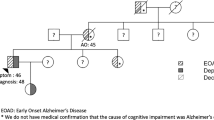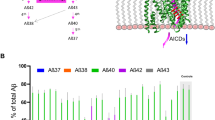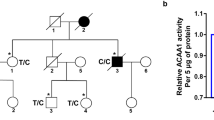Abstract
Causative variants in APP, PSEN1 or PSEN2 account for a majority of cases of autosomal dominant early-onset Alzheimer disease (ADEOAD, onset before 65 years). Variant detection rates in other EOAD patients, that is, with family history of late-onset AD (LOAD) (and no incidence of EOAD) and sporadic cases might be much lower. We analyzed the genomes from 264 patients using whole-exome sequencing (WES) with high depth of coverage: 90 EOAD patients with family history of LOAD and no incidence of EOAD in the family and 174 patients with sporadic AD starting between 51 and 65 years. We found three PSEN1 and one PSEN2 causative, probably or possibly causative variants in four patients (1.5%). Given the absence of PSEN1, PSEN2 and APP causative variants, we investigated whether these 260 patients might be burdened with protein-modifying variants in 20 genes that were previously shown to cause other types of dementia when mutated. For this analysis, we included an additional set of 160 patients who were previously shown to be free of causative variants in PSEN1, PSEN2 and APP: 107 ADEOAD patients and 53 sporadic EOAD patients with an age of onset before 51 years. In these 420 patients, we detected no variant that might modify the function of the 20 dementia-causing genes. We conclude that EOAD patients with family history of LOAD and no incidence of EOAD in the family or patients with sporadic AD starting between 51 and 65 years have a low variant-detection rate in AD genes.
Similar content being viewed by others

Log in or create a free account to read this content
Gain free access to this article, as well as selected content from this journal and more on nature.com
or
References
Wallon D, Rousseau S, Rovelet-Lecrux A et al: The French series of autosomal dominant early onset Alzheimer's disease cases: mutation spectrum and cerebrospinal fluid biomarkers. J Alzheimers Dis 2012; 30: 847–856.
Lohmann K, Klein C : Next generation sequencing and the future of genetic diagnosis. Neurotherapeutics 2014; 11: 699–707.
Della Mina E, Ciccone R, Brustia F et al: Improving molecular diagnosis in epilepsy by a dedicated high-throughput sequencing platform. Eur J Hum Genet 2014; 23: 354–362.
Rehm HL : Disease-targeted sequencing: a cornerstone in the clinic. Nat Rev Genet 2013; 14: 295–300.
Beck J, Pittman A, Adamson G et al: Validation of next-generation sequencing technologies in genetic diagnosis of dementia. Neurobiol Aging 2014; 35: 261–265.
McKhann GM, Knopman DS, Chertkow H et al: The diagnosis of dementia due to Alzheimer's disease: recommendations from the National Institute on Aging-Alzheimer's Association workgroups on diagnostic guidelines for Alzheimer's disease. Alzheimers Dement 2011; 7: 263–269.
Duits FH, Prins ND, Lemstra AW et al: Diagnostic impact of CSF biomarkers for Alzheimer's disease in a tertiary memory clinic. Alzheimers Dement 2014; 11: 523–532.
Rovelet-Lecrux A, Hannequin D, Raux G et al: APP locus duplication causes autosomal dominant early-onset Alzheimer disease with cerebral amyloid angiopathy. Nat Genet 2006; 38: 24–26.
Li H, Durbin R : Fast and accurate long-read alignment with Burrows-Wheeler transform. Bioinformatics 2010; 26: 589–595.
McKenna A, Hanna M, Banks E et al: The Genome Analysis Toolkit: a MapReduce framework for analyzing next-generation DNA sequencing data. Genome Res 2010; 20: 1297–1303.
Guerreiro RJ, Baquero M, Blesa R et al: Genetic screening of Alzheimer's disease genes in Iberian and African samples yields novel mutations in presenilins and APP. Neurobiol Aging 2010; 31: 725–731.
Rademakers R, Neumann M, Mackenzie IR : Advances in understanding the molecular basis of frontotemporal dementia. Nat Rev Neurol 2012; 8: 423–434.
Nygaard HB, Lippa CF, Mehdi D, Baehring JM : A novel presenilin 1 mutation in early-onset Alzheimer's disease with prominent frontal features. Am J Alzheimers Dis Other Dement 2014; 29: 433–435.
Walker ES, Martinez M, Brunkan AL, Goate A : Presenilin 2 familial Alzheimer's disease mutations result in partial loss of function and dramatic changes in Abeta 42/40 ratios. J Neurochem 2005; 92: 294–301.
Sleegers K, Roks G, Theuns J et al: Familial clustering and genetic risk for dementia in a genetically isolated Dutch population. Brain 2004; 127: 1641–1649.
Stenson PD, Mort M, Ball EV, Shaw K, Phillips A, Cooper DN : The Human Gene Mutation Database: building a comprehensive mutation repository for clinical and molecular genetics, diagnostic testing and personalized genomic medicine. Hum Genet 2014; 133: 1–9.
Genome of the Netherlands Consortium: Whole-genome sequence variation, population structure and demographic history of the Dutch population. Nat Genet 2014; 46: 818–825.
Dumanchin C, Brice A, Campion D et al: De novo presenilin 1 mutations are rare in clinically sporadic, early onset Alzheimer's disease cases. French Alzheimer's Disease Study Group. J Med Genet 1998; 35: 672–673.
Portet F, Dauvilliers Y, Campion D et al: Very early onset AD with a de novo mutation in the presenilin 1 gene (Met 233 Leu). Neurology 2003; 61: 1136–1137.
Genin E, Hannequin D, Wallon D et al: APOE and Alzheimer disease: a major gene with semi-dominant inheritance. Mol Psychiatry 2011; 16: 903–907.
McNaughton D, Knight W, Guerreiro R et al: Duplication of amyloid precursor protein (APP), but not prion protein (PRNP) gene is a significant cause of early onset dementia in a large UK series. Neurobiol Aging 2012; 33: 426.e13–426.e21.
Llado A, Grau-Rivera O, Sanchez-Valle R et al: Large APP locus duplication in a sporadic case of cerebral haemorrhage. Neurogenetics 2014; 15: 145–149.
Guerreiro R, Wojtas A, Bras J et al: TREM2 variants in Alzheimer's disease. N Engl J Med 2013; 368: 117–127.
Jonsson T, Stefansson H, Steinberg S et al: Variant of TREM2 associated with the risk of Alzheimer's disease. N Engl J Med 2013; 368: 107–116.
Pottier C, Wallon D, Rousseau S et al: TREM2 R47H variant as a risk factor for early-onset Alzheimer's disease. J Alzheimers Dis 2013; 35: 45–49.
Gilissen C, Hoischen A, Brunner HG, Veltman JA : Unlocking Mendelian disease using exome sequencing. Genome Biol 2011; 12: 228.
de Ligt J, Willemsen MH, van Bon BW et al: Diagnostic exome sequencing in persons with severe intellectual disability. N Engl J Med 2012; 367: 1921–1929.
Beck J, Poulter M, Hensman D et al: Large C9orf72 hexanucleotide repeat expansions are seen in multiple neurodegenerative syndromes and are more frequent than expected in the UK population. Am J Hum Genet 2013; 92: 345–353.
Kohli MA, John-Williams K, Rajbhandary R et al: Repeat expansions in the C9ORF72 gene contribute to Alzheimer's disease in Caucasians. Neurobiol Aging 2013; 34: 1519.e5–1519.e12.
Galimberti D, Arosio B, Fenoglio C et al: Incomplete penetrance of the C9ORF72 hexanucleotide repeat expansions: frequency in a cohort of geriatric non-demented subjects. J Alzheimers Dis 2014; 39: 19–22.
Perry DC, Lehmann M, Yokoyama JS et al: Progranulin mutations as risk factors for Alzheimer disease. JAMA Neurol 2013; 70: 774–778.
Guerreiro RJ, Lohmann E, Kinsella E et al: Exome sequencing reveals an unexpected genetic cause of disease: NOTCH3 mutation in a Turkish family with Alzheimer's disease. Neurobiol Aging 2012; 33: 1008, e1017-1023.
Jayadev S, Nochlin D, Poorkaj P et al: Familial prion disease with Alzheimer disease-like tau pathology and clinical phenotype. Ann Neurol 2011; 69: 712–720.
Guerreiro R, Bras J, Wojtas A, Rademakers R, Hardy J, Graff-Radford N : A nonsense mutation in PRNP associated with clinical Alzheimer's disease. Neurobiol Aging 2014; 35: 2656, e2613-2656.
McKhann G, Drachman D, Folstein M, Katzman R, Price D, Stadlan EM : Clinical diagnosis of Alzheimer's disease: report of the NINCDS-ADRDA Work Group under the auspices of Department of Health and Human Services Task Force on Alzheimer's Disease. Neurology 1984; 34: 939–944.
Petersen RC, Aisen PS, Beckett LA et al: Alzheimer's Disease Neuroimaging Initiative (ADNI): clinical characterization. Neurology 2010; 74: 201–209.
Rinne JO, Brooks DJ, Rossor MN et al: 11C-PiB PET assessment of change in fibrillar amyloid-beta load in patients with Alzheimer's disease treated with bapineuzumab: a phase 2, double-blind, placebo-controlled, ascending-dose study. Lancet Neurol 2010; 9: 363–372.
Schoonenboom NS, Reesink FE, Verwey NA et al: Cerebrospinal fluid markers for differential dementia diagnosis in a large memory clinic cohort. Neurology 2012; 78: 47–54.
Lim A, Tsuang D, Kukull W et al: Clinico-neuropathological correlation of Alzheimer's disease in a community-based case series. J Am Geriatr Soc 1999; 47: 564–569.
Andreasson U, Lautner R, Schott JM et al: CSF biomarkers for Alzheimer's pathology and the effect size of APOE varepsilon4. Mol Psychiatry 2014; 19: 148–149.
Dubois B, Feldman HH, Jacova C et al: Advancing research diagnostic criteria for Alzheimer's disease: the IWG-2 criteria. Lancet Neurol 2014; 13: 614–629.
Mouton-Liger F, Wallon D, Troussiere AC et al: Impact of cerebro-spinal fluid biomarkers of Alzheimer's disease in clinical practice: a multicentric study. J Neurol 2014; 261: 144–151.
Acknowledgements
We are grateful to Tracey Avequin for her help in editing the manuscript. This study was funded by grants from the Clinical Research Hospital Program from the French Ministry of Health (GMAJ, PHRC 2008/067) to Didier Hannequin and Dominique Campion, the CNR-MAJ and the JPND PERADES. The funding sources had no specific roles. CNR-MAJ collaborators: Didier Hannequin, Dominique Campion, David Wallon, Olivier Martinaud, Gaël Nicolas (Centre Hospitalo-Universitaire (CHU), Rouen); Olivier Godefroy (CHU Amiens); Frédérique Etcharry-Bouyx, Valérie Chauviré (CHU Angers); Ludivine Chamard, Eric Berger, Eloi Magnin (CHU Besancon); Jean-Francois Dartigues, Sophie Auriacombe (CHU Bordeaux); Vincent de la Sayette, Fausto Viader (CHU Caen); Dominique Castan (CH Castres), Elsa Dionet (CHU Clermont-Ferrand); Francois Sellal (CH Colmar); Olivier Rouaud, Christel Thauvin (CHU Dijon); Olivier Moreaud, Mathilde Sauvée (CHU Grenoble); Adeline Rollin-Sillaire, Stéphanie Bombois, Marie-Anne Mackowiak, Vincent Deramecourt, Florence Pasquier (CHU Lille); Maïté Formaglio, Hélène Mollion, Isabelle Roullet-Solignac, Alain Vighetto, Bernard Croisile (CHU Lyon); Mira Didic, Olivier Félician, Lejla Koric, Mathieu Ceccaldi (CHU Marseille); Audrey Gabelle, Cecilia Marelli, Jacques Touchon, Pierre Labauge (CHU Montpellier); Thérèse Jonveaux (CHU Nancy); Martine Vercelletto, Claire Boutoleau-Bretonnière (CHU Nantes); Giovanni Castelnovo (CHU Nimes); David Renaud, Philippe Robert (CHU de Nice); Claire Paquet, Julien Dumurgier, Jacques Hugon (CHU Lariboisière, Paris); Agnès Michon, Isabelle Le Ber, Bruno Dubois, Charles Duyckaerts (CHU La Salpêtrière, Paris); Foucauld De Boisgueheneuc (CHU Poitiers); Serge Belliard (CHU Rennes); Serge Bakchine (CHU de Reims); Marie-Odile Barrellon, Bernard Laurent (CHU Saint-Etienne); Frédéric Blanc, Christine Tranchant (CHU Strasbourg); Jérémie Pariente, Michèle Puel (CHU Toulouse); and Caroline Hommet, Karl Mondon (CHU Tours).
Author information
Authors and Affiliations
Corresponding author
Ethics declarations
Competing interests
The authors declare no conflict of interest.
Additional information
Supplementary Information accompanies this paper on European Journal of Human Genetics website
Rights and permissions
About this article
Cite this article
Nicolas, G., Wallon, D., Charbonnier, C. et al. Screening of dementia genes by whole-exome sequencing in early-onset Alzheimer disease: input and lessons. Eur J Hum Genet 24, 710–716 (2016). https://doi.org/10.1038/ejhg.2015.173
Received:
Revised:
Accepted:
Published:
Issue date:
DOI: https://doi.org/10.1038/ejhg.2015.173
This article is cited by
-
Early-onset Alzheimer’s disease due to novel LDLR gene mutation
Acta Neurologica Belgica (2024)
-
One Train May Hide Another: Two Cases of Co-Occurring Primary Familial Brain Calcification and Alzheimer’s Disease
Journal of Molecular Neuroscience (2024)
-
Penetrance estimation of Alzheimer disease in SORL1 loss-of-function variant carriers using a family-based strategy and stratification by APOE genotypes
Genome Medicine (2022)
-
Differential effects of risk factors on the cognitive trajectory of early- and late-onset Alzheimer’s disease
Alzheimer's Research & Therapy (2021)
-
Impaired SorLA maturation and trafficking as a new mechanism for SORL1 missense variants in Alzheimer disease
Acta Neuropathologica Communications (2021)


